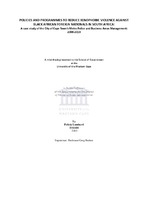| dc.description.abstract | South Africa continues to experience unprecedented levels of violence against foreign African nationals, to be more specific, black African foreign nationals in poor communities but also in cities. Local Government has become a major role-player in the functioning of South Africa’s democracy and in managing local conflicts. In light of this, this research-based mini-thesis explores the policies and programmes used in the City of Cape Town Municipality to reduce xenophobic violence against black African foreign nationals in the city. I acknowledge the importance of understanding the historical background of racial conflict in South Africa, and briefly look at whether this attributes to current conflict against black foreign nationals by evaluating competing theories of xenophobic violence. Whilst South Africans found refuge in neighbouring countries during the apartheid era, recent migration patterns reveals a reverse of this trend as the upper regions of the continent suffer war and famine and nationals of those countries seek refuge in South Africa. The Alien Control Act of 1991 strengthened South Africa’s national borders and made it difficult for foreigners to enter the country without the needed ocumentation. However, South Africa’s transition from an apartheid state to a democracy brought with it a number of changes, including an increase in the number of migrants who was previously not allowed to enter the country. One of the major concerns for government has been the issue of distinguishing between those who are in the country legally and those who are in the country illegally. In this mini-thesis, I draw a clear distinction between the different categories of foreigners in South Africa. Xenophobia broke into public view in May 2008 when black South Africans living in townships that suffer poor living conditions and high levels of crime, violently attacked black African foreign nationals working and living among them. The scale of the attacks led to the mass displacement of black African foreigners as they sought protection in refugee camps set up by the state as well as other organizations. Black African foreigners were severely assaulted in the violence. Some were burned while others suffered the looting of their belongings. Local government has an important role to play in the functioning of democracy in South Africa. I am of the view that the policies and programmes employed at local government level would significantly reduce the incidences of xenophobic violence experienced in South African communities, since local government has easier access to communities and people at grassroots level. Xenophobia is not a peculiarly South African problem, and many local governments around the world have used various methods of addressing this. While insights into their methods would be helpful; the focus of this thesis is on South Africa and more specifically the City of Cape Town. In this mini-thesis, I thus investigate the policies and programmes employed by the City of Cape Town municipality in reducing xenophobic violence against black foreign nationals. | en_US |

